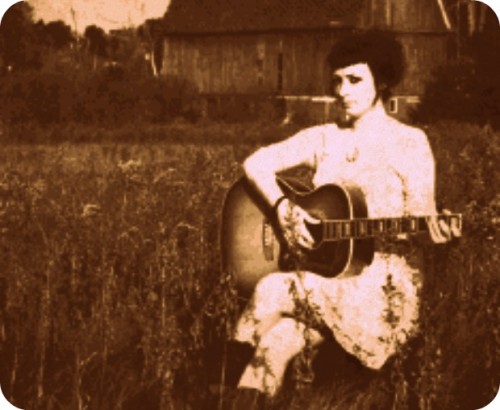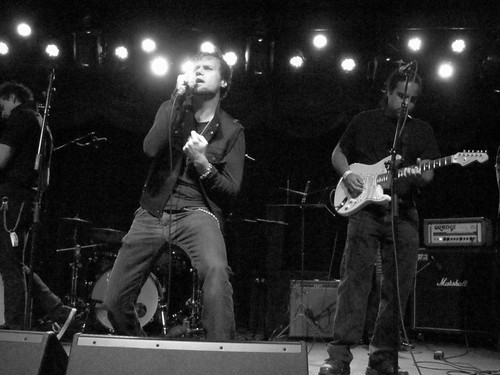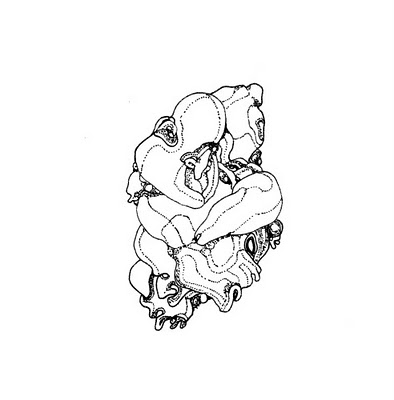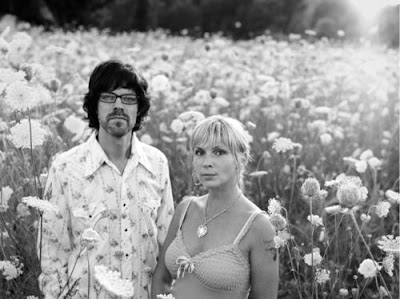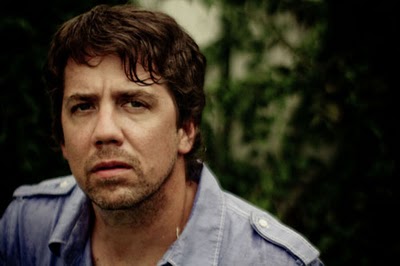
Listening to Patrick Sweany’s albums is like reading his life. In between and over top of melodies that are sometimes sweet and sometimes rough, deftly finger-picked on acoustic and electric guitar, Sweany uses the full range of his rich baritone to sing of everything from the rigors of touring to the most painful complications of love. He doesn’t pull many punches, laying out his struggles and fears with his career and his personal life under a lens that looks as unflinchingly at himself as it does at anyone else. His voice, sometimes soft as a hand brushed against a loved one’s skin, sometimes as harshly ragged as a rusted-out muffler dragged down miles of dusty backroads, reflects the truth of every word.
Drawing on influences from Mississippi blues to classic soul to New Orleans R&B; to classic country & western to protest folk to rock of all stripes to a wealth of other styles and sounds that he has avidly devoured since his childhood, Sweany has steadily, industriously been carving out a career for over a decade, producing five albums to date (with one, C’mon C’mere, co-produced by Jimbo Mathus and Dan Auerbach and another, Every Hour is a Dollar Gone, produced by Auerbach). Coming out of Northeastern Ohio and currently settling in Nashville, Patrick Sweany is a sharp, smart, funny, determined man with a flair for storytelling. Though he has a degree in English Literature (“which I pronounce ‘Let-trah-chah,’ and rotate my palm upward, swirling the brandy in my imaginary snifter,” Sweany says), it’s clear that Sweany was meant for music not only because of his immense talent, but because he is also someone who truly loves music (When I told him of how standing in Sun Studio in Memphis had me fighting back tears, he confessed, “The Stax museum did the same to me, just brought me to tears.”*). This may seem like a redundant thing to say about a musician, but, trust me, it’s more rare than it should be.
Patrick Sweany’s fifth album, the beautiful That Old Southern Drag will see physical release on February 15 (and it’s already available for download on his Bandcamp site). Thanks to a push from NTSIB collaborator Nate Burrell, I was able to sit down, via e-mail, with Sweany for a lovely chat that revealed how The Cosby Show was integral to his development into a musician, the existence of a secret juke joint in the middle of downtown Cleveland and more.
Alright, Mr. Sweany, let’s do this thing. (And thanks again for doing this thing with me.)
I know your father plays guitar and was an influence on you, but was there a “moment” that set you on the road to being a musician?
The moment where I decided “I want to be a musician,” was probably when I was about 12 or 13. I was probably 12. Mom and Dad were working, my brothers were down in the basement playing video games, and I was listening to a Pete Seeger album that my dad had, on the big console stereo. The album was recorded live, and it was just so great. The way all those people listened to him and sang along when he asked them to and erupted with applause, and the way that performance made me feel. I hadn’t really been exposed to a lot of different music, other than what my dad had, so none of this music sounded dated, or folk-y in the derogatory sense. I was just a kid. I had no concept of what the social and societal ramifications of the particular time frame (MLK, Kennedy, pre-summer of love, civil rights movement) were when that recording was made. I knew that at that point in my life, this record moved me and I wanted to be there. The guy on the record was just one guy. My Dad could play most of the songs on that record. I knew my dad was a cool guy, so I figured I’m his kid, I could be cool, I could pull this off. I felt so knocked out and excited by guys playing guitars and singing, I just wanted to be like that. I wanted to do what they were doing. It was different than watching a guy win a game.
There were other times. Hearing Ray Charles’ “Night Time is the Right Time” on The Cosby Show. Watching it in the living room with my Mom and Dad and my brothers. That was before everyone had cable, before most TVs had remote controls. All the Huxtable kids were lip synch-ing and dancing to the record. Ray’s voice, that band, Margie Hendricks singing, hollerin’, “Squeeze me, hold me tight. You know I love you… etc.” It made me so excited. Remember, I’m just a kid, and sex wasn’t anything I was remotely thinking about. I knew what it was, but I didn’t understand anything about it. I was excited like a kid gets about riding bikes or new toys. I wanted to holler like that. I didn’t understand what Margie and Ray were saying, but I could feel it was something different. I wanted to make people dance like the kids on TV. I didn’t want that song to be over. I don’t think we had a VCR or anything at that time, not that many people did, if any. It was just gone when it was over. I felt little bit embarrassed because I wanted to know about it, but I didn’t understand. It was just something that I thought about. It would make me excited when I thought about it, and I would mouth what I thought the words were when I was alone, and maybe dance around a little bit, using my imagination, like a kid does. I didn’t really know who Ray Charles was until a few years later, but I figured it out pretty naturally.
Your answer leads into so many other things I want to ask you. For instance, the joy and excitement you obviously found in music then still comes through in your performances now. One of the things that knocks me out most about your music is the passion that comes through, especially in your voice. Since you’ve been at this for a while now, do you find that passion and excitement difficult to maintain? Or is it just like breathing for you?
Doing a gig/performing is always exciting. If I let it all hang out, really let it fly on the bandstand, play good, holler in key, and really move around and get sweaty, I feel really good. Better than anything else, I’ve found. It’s kept me from getting into self destructive behavior (despite providing countless opportunities to do exactly that!), it’s given me an opportunity to meet people and see places I never would have known existed. It seems to make other people able to feel good. Vocalizing that emotion is important to conveying that, so I sometimes push the voice a little harder than I probably should, but I have a pretty firm grasp of my limits, or least what I can bounce back from. I get a lot of satisfaction from entertaining people. The physicality of it is important. It’s not all of it. A lot of the greats are great because they reached people, made them feel like they were a part of it. (“That song reminds me of when I was ______.”)
I feel like I’ve got a perspective on American music that’s a little unique to what most people know, but it comes from a root that’s familiar to them. I put what’s happening in my life into a song, but I try to be aware that the purpose of this whole thing is that people all feel the same on the inside, and they feel good when they feel somebody relates specifically to them.
I need to do this. I’m 36 years old, and I don’t know how to do anything else. Do you have any idea how intimidating it is to fill out a job application with a 15 year gap in your employment history titled “self employed musician.” I went to colleg
e. I got a degree, but I used college as a diversionary tactic so I could be a musician. The education I was able to absorb along the way was invaluable, and allowed me a lot of perspective that I probably would have missed out on, but it was always secondary to music. I guess maybe that’s where a lot of that fire comes from, still trying to prove this is really what I’m supposed to be doing.
You say you feel you have a unique perspective on American music – can you expand on that?
I probably wouldn’t have said “unique perspective” if I knew I had to explain it. It’s a figure of speech musicians use that means “I’m stupid and insecure, but I want people to think I’m smart and cool.”
But I love talking about me, so here goes…
Mom was born in Liverpool, England. She’s the same age as McCartney. Poor. Working class. Went out dancing, like kids did then. Saw the Beatles like any other dozen bands that played around the clubs and dances. Beatles got popular. Brian Epstein’s family owned a lot of the record stores in Liverpool. So, my introduction to the most influential phenomenon in modern popular art and culture is this quote from my mother: “You know they got famous because their manager’s family owned all the record stores, then they got into drugs…”
So, beyond their first batch of American singles, of which my Dad had a record, I never listened to them until very late in my college career. And even then, not much. I listened to the folk records that my dad had, when I developed enough attention span to really listen to music. My dad stopped buying albums when Dylan went electric. And for some reason I just really dug that stuff. Pete Seeger, early Gordon Lightfoot, the first Dylan albums, Tom Rush, Dave Van Ronk, etc., just made sense to me. Beautiful songs, deceptively simple accompaniment. Just people singing and playing acoustic instruments. Dad had some Leadbelly albums, and some comps with Lightnin’ Hopkins and acoustic John Lee Hooker that were just otherworldly. He had some Rock and Roll stuff, like Buddy Holly, Fats Domino, etc. Through that, I read album jackets and just threw myself into learning about all these fingerstyle acoustic blues guys from the 1920s and ’30s. Willie McTell, Booker White, Tampa Red, Charlie Patton, Skip James, Gary Davis, Furry Lewis, The Memphis Jug Band. And lots of piano players, Little Brother Montgomery, Speckled Red, Roosevelt Sykes. And I just dove in, this is what I want to do. I want to play this music, the way these guys did it. No plugged in guitars, no artifice. I studied and performed this stuff and really worked hard to get to the essence of what made this stuff happen. I made a conscious decision that I wasn’t going to come at this stuff with modern rock music as the template or filter through which I viewed it. It didn’t sound dated or hokey to me. It sounded good. I was listening to modern, popular music with my friends, and enjoying it, but none of them played guitar or any instruments, and nobody thought the old stuff I was into was cool. I figured out almost every one the guys I liked plugged into electric guitars as soon as they were able, and I got into Muddy Waters, Elmore James, B.B. King, Magic Sam, Howlin’ Wolf, Sonny Boy Williamson, and then I started really getting into Soul music. Ray Charles, Sam Cooke, Sam and Dave, Otis Redding, Aretha Franklin and Percy Sledge. At the same time, I was also digging on George Jones, Merle Haggard, Willie Nelson, Tom T. Hall, Conway Twitty, Lefty Frizzell and Hank Williams. I was still riding around in beat up cars, drinking cheap beer with my high school friends, listening to the first Metallica tapes, lots of Led Zeppelin records and stuff like that, which I still love, but I always had this secret guitar life.
Speaking of the classic bluesmen, I read that you played with Hubert Sumlin and Steady Rollin’ Bob Margolin. How did that come about and what was it like to play with them?
(And speaking of wanting people to think I’m smart and cool, I feel proud of myself for recognizing all but two names you listed.)
I was hanging out with “Moonshine” Pete Schidmt, a real raw, cool harmonica player who lived down the street from a gig I had way out in the country east of Cleveland, but it was only about 90 minutes from where I was living in PA for a couple years. He’s a white guy that used to run around in the ‘hood in Cleveland back in the ‘70s and ‘80s, and he knew all the real cats. Pete was kind of a street guy, real tough, kind of wild, but cool. Real sweet guy. I’m sure he gave a dozen amps and mics to guys in the hood, like (Cleveland) Guitar Slim, and cats who played blues, but didn’t leave the hood. He married Slim’s niece, had some kids and was living life out in the sticks when we met. We got to be friends and he said, “I’m going to take you to see Robert, and then we’ll go play with Slim.” Robert Jr. Lockwood, who lived in Cleveland and was one of my all time heroes. I had opened some shows for Robert, and he was always really nice to me, and I’ve watched him dozens of times. He’s the most underrated influence on the sound of the guitar in the latter 20th century.
Well, Pete had a guy that would bring up jugs of moonshine from Alabama. It’s the best I’ve ever had. The old cats that didn’t drink anymore would almost always take a little shine and reminisce. That Pete is a smart fella’. So, I got to sit knee to knee with Robert Jr., and pass the guitar back and forth, with the pretense of dropping off a little shine. I couldn’t believe it. Pete says, “Hey, we got to go to Slim’s birthday party. Bring this jar, don’t drink any of Slim’s, I got sick last time I drank his shit.” Got it. So, we go down in the ‘hood. It is deep. We park and walk up to this big, old, 3 story, firetrap house down near Hough, buzzer on the door(!) with a kid working the door, and walk up to the third floor, up these narrow stairs. We walk in, Pete and his wife know everybody, and it’s a big linoleum floored, wood paneled room with a little bar at one end, tables against the walls and amps and drums in the corner. They’re selling beer and shine, and they were waiting on Pete to bring another amp and get down. It was an honest to goodness juke joint, right in the city. Fun as hell. People dancin’, it was great.
So, afterwards there’s most of a jar left, Pete says, “Keep it. Give some to Hubert when you see him.”
I was booked to play at the Marietta, OH, Blues festival later that month, Bob Margolin (of the Muddy Waters Band) and Hubert Sumlin (Howlin’ Wolf’s guitar player!!!) were the headliners.
I cornered Bob beside the stage and said, “Hey Bob, blah blah, I’d like to give Hubert some shine, don’t want to be a bad influence or wreck your show, I’ll taste some if you are worried about it, we gave some to Robert Jr., etc…” Bob said, “I’d love to have Hubert sip some and turn on the tape machine when we get home.”
“That’s great Bob, here you are.”
“You wanna sit in?”
“Why, yes I do.”
Easiest question you’ve ever been asked, right?
A juke right in the middle of Cleveland. How fantastic.
How long have you been in Nashville now? Thinking of “Leaving Ohio”, I wonder if it’s gotten any easier for you since moved down there.
Financially, it’s as tough a situation as I’ve ever been in, but I really love living here. It was tough at first, no close friends, feeling like I was just starting a whole career over. I’m getting to know more folks and my personal life with my fiancee is great, we moved here together. Pretty happy as it goes. More Ohioans are moving here all the time. I miss home though. I guess everybody does.
I had mixed feelings about Dan Auerbach and Patrick Carney moving down there at first, but I understand
the desire.
Speaking of the Black Keys, there was discussion on the Black Keys Fan Lounge Forum about how living in Nashville might affect the sound of the band since many people think of country music when they think of Nashville (even though I know there are a number of great rock bands based out of Nashville now). Do you see Nashville influencing your musical direction?
As far as influencing the sound, that is something to consider. It certainly has. I am among the most skilled, educated and professional musicians in the world. The guys I hire in Nashville show up prepared, on time, with the right gear, and ready to play. They are knowledgeable and confident in their abilities and able to take direction in order to make who they are working for sound the best. In Nashville, you are able to hire the right man for the job.
The terrible music that is recorded here that is marketed as country music overshadows most of what the world outside of Nashville views as “the sound of Nashville.” If you listen to shitty pop radio music, it’s shitty music. People buy it for some reason, so they keep reproducing it, usually here in town because it’s centrally located, tons of studios, tons of musicians, etc. It’s the music BUSINESS center. If you work in fashion, New York is where you go for opportunities. Nashville = Music. If you make shitty throw-away music, you’ll make shitty sounding throw-away music here. If your are happy being derivative and soulless, location can’t help that. If you care about how your record sounds, you won’t sound like a those records.
Hell yes, Nashville is influencing my musical direction. It’s influencing to me to explore my roots more deeply, be more careful with language, and be a better performer to differentiate myself from the crowd.
Speaking of your language, your songwriting is so damn honest. Is it ever hard to perform a song that is particularly personal? A song like “Two or Three” seems like it might rake you over the coals. How do you deal with that when it comes showtime?
There is enough time in the writing process, and the subsequent practice performing the material prior to recording, to be able to put distance between you and the story. I guess it comes from interpreting other really heavy duty material that you didn’t write, that you really relate to. I used to cry every time I listened to certain songs (by other artists). Now I don’t. When you read a book that you really like, in your mind, you put yourself in that story, one way or another, and you are able to deal with it, and gain catharsis from it.
Do I like talking about the really shitty situations in my personal life in the past? No. Did I come away from that particular situation you referred to in “2 or 3” with any sense of closure or feeling that I was the good guy? No. Not at all. Broken homes are awful things. Children suffer for it. It’s never completely okay.
Things just get easier to work around as you get used to them, over time.
Short answer: you get used to it. A performer performs.
I can’t recall where I read it or who said it, but someone once said something about how the best soul love songs were really just gospel songs done in a secular vein, and I know that a few of the songs that Isaac Hayes and David Porter wrote together were actual adaptations of gospel songs, right down to the titles. “The Edges” seems like that kind of song: depending on your perspective, it could be romantic or spiritual. Was that conscious? And which is it for you, romantic or spiritual?
I was really tempted to just say, “Both.”
And leave it at that, but that’s not very nice.
Haha! I almost gave you “both” as an option, but decided I should try to make you choose one.
“The Edges”: I just respond to, and feel comfortable with that type of song. The gospel influenced secular song. It has a groove that, by design, elicits emotional reaction and frees the singer to express him(her)self by providing a template of language or vocabulary that seems fresh, due to the freedom of phrasing. It works like a sonovabitch.
I don’t feel it as a conscious decision, I just get little ideas, and I flesh them out, try different grooves and make sure I’m not directly ripping something off. (Ya’know, sometimes I make sure.)
“The Edges” is about when I met my fiancee and how she made me feel like I could start to get on with having a real personal life. I was not really a very happy person. No relationships of any depth, by choice, and a little bitter. She changed that. Did not see that comin’.
I am also a sucker for that bugaloo groove and deeper voiced singers like Jerry Butler, Brook Benton, etc., and I hadn’t really ripped off either one, lately.
I gathered some questions from the Black Keys Fan Lounge forum because you have some avid fans there. One person wants to know more about “Frozen Lake”. Aside from being a lovely piece, it has a little different feel from the rest of the album. Clearly recorded live, it has a really intimate feel. Can you talk a little bit about the song and the recording of it?
Well, I don’t know what there is to say about it. We recorded it in the hallway, miked my acoustic guitar with a really nice ribbon mic, and also had it plugged into an amp in the bathroom. Maybe a little ambient mic in the room to give it a little, well, ambience. Sang it and played it. My thrift store Sam Cooke song about how it’s really easy to end up alone.
Amps in bathrooms seems to be a popular choice when recording. Give it up for shower-singing acoustics.
Another forum regular would like to know how you and Dan Auerbach met. I know Dan used to play with the Patrick Sweany Band), so was it just through the usual musician connections? You two seem like brothers from different mothers in terms of musical aesthetics and influences (and I’d wager that Dan drew some influence from you).
A friend of mine, Mike Lenz, was giving Dan some lessons and letting him sit in at gigs and said, “Hey, you should hear this kid, he’s into all this Mississippi stuff and Hounddog Taylor.” So, Dan came out with his dad, Chuck, and I invited him to sit in, he kept coming out, and eventually I just got rid of the bass player and had Dan handle the low end guitar stuff instead of a bass. Hounddog Taylor did this with his guitar player, Brewer Phillips, and he was one our mutual heroes.
I’ve showed Dan some things, guitar stuff, alternate tunings, but he was well on his way down the path, always focused. I’m older than Dan, and I was heavy into the Country Blues thing so I was the guy to ask. The Ampeg Gemini 1 that Dan plays on their first record, he found out about from me. The Gemini 1 was my first amp and still my favorite. Dan was in the band until he just got too busy with the Keys. We still hang out, now that he lives in the Nash.
While we’re on the subject of Dan, another forum regular is curious about the most memorable moment during the recording/production of Every Hour Is a Dollar Gone.
I would have to say the most memorable moment during the recording of Every Hour… is when Dan invited me to join the Black Keys as the lead singer and maracas player, and I turned them down. Just Kidding. There aren’t any real memorable things that come to mind. It’s work, you show up, you run the songs, listen back to the tracks, we spent 3 days tracking and it was done. It happens fast, there isn’t much messing around. That album was done almost 4 years ago.
Tell me about the Tiger Beats.
The Tiger Beats are my friends Ron Eoff (Cate Bros, The Band), Joe McMahan and Jimmy Lester (Webb Wilder, Los Straitjackets). We play old ’50s style blues and R&B; like Howlin’ Wolf, Jimmy Reed, Elmore James, Bobby Blue Bland, etc. It’s my all fun, no hassle blues band.
Nice lineup. So, there’s probably no plans to make a Tiger Beats
record? Do you just play around Nashville?
We have been thinking about doing a record, and writing material for it, but focus is on my new record right now. We only play in Nashville, by design, for the time being.
What are your plans for the foreseeable future, outside of your record release shows?
Future: The Van. Covering as much of the map as possible.
Any chance of a gig in Cleveland proper?
Possibly in the spring, we may play Cleveland.
And, finally, because I tend to get my best music recommendations from musicians I love: what music have you been listening to lately?
I have really been eaten up with Joe Tex, which is nothing new, but deeeeeeeeeep soul. Nick Lowe’s The Convincer, but it’s from 2001. That album wrecked me yesterday when Joe McMahan turned me on to it. Transcendent.
I was just listening to “Skinny Legs and All” the other day. My curse as a music blogger: while everyone else is listening to newer and newer music, I keep listening to older and older music.
Well, Mr. Sweany, thank you so much. This has been such a pleasure. Congratulations on the new album and your engagement.
Thank You! I really appreciate your patience. In the last two weeks, I’ve driven back and forth to NW Arkansas twice, drove to Jacksonville, FL, and back, and played two shows and an instore, here in town. It makes all the difference in the world to actually talk about real things in an interview instead of rehashing the one sheet. Thanks.
Patrick Sweany Official Website
Patrick Sweany on Bandcamp
*Patrick and I both recommend the book Soulsville U.S.A.: the Story of Stax Records by Rob Bowman.





